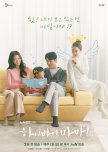Sweet, But Ultimately Boring...
Hi Bye, Mama!" did honestly showcase all the correct attributes of being a brilliant drama with a varied cast ( in particular the talents of Kim Tae-Hee, Kim Mi-Kyung and Lee Kyu-Hyung), intriguing characters and a unique storyline centralising upon the lesser-tackled subject in K-dramas of maternal love in addition to themes of bereavement and grief . However, as the story progressed, the second half of “ Hi Bye, Mama!” slowly began to degrade the storyline, characterisation and the pacing of the show into a dragging and painful experience for viewers trying to hold-on for another eight episodes .
Of course, this fault can’t entirely be imposed upon our main cast. Kim Tae-Hee was fairly brilliant as our female lead Cha Yu-Ri. Although she did arguably have some questionable acting moments when the show attempted to offer more “ comedy”, she still played the role of her character as both a mother who adores her child, and an individual with a heart of gold as well. Similar to Kim Tae-Hee, Lee Kyu-Hyung did also have to questionable line deliverances at times, but, he did add a level of emotional and multi-faceted complexity to his role as a re-married widow and surgeon who painfully feels guilt and grief over not being able to save Yu Ri’s life after the accident.
As a character, Cha Yu Ri is intrinsically a grief-stricken mother who is unable to do anything , but watch the events unfold around her daughter’s early milestones ( such as taking her first step and talking) which she is constantly remind of not being a part of. This is what defined Yu Ri as a character. She is a woman who will do anything to protect and watch-over her daughter . Then, in an attempt to heighten angst rather than actual logic, “ Hi, Bye Mama!” decided to resurrect Yu-Ri; arguably the distinct climatic point in the drama when the storyline and characters began to fall down.
Despite the ridiculousness of the story-arc, it isn’t necessarily the concept itself where the show failed but rather, the wasted potential of character progression. Being resurrected, Yu Ri seems to have left her brains behind on the other side at times within the show, making ridiculous and rash decisions as well as hiding important truths from her shocked former-husband which by default could have had a destructive psychological impact upon his own relationship with Min-Jung, one of the few maternal figures for her daughter, and of course his already estranged relationship with Seo-Woo.
Similarly, Cho Gang-Hwa started off as an interesting character; a man blaming himself for something he could not have foreseen, remarried for convenience rather than love and shying away from his daughter in fear of being reminded of Yu Ri. Yet even early on the drama, one of the most prominent issues which stuck out like a saw thumb for Gang-Hwa’s character, had to be how on earth he was still being paid and working in a hospital as a “ surgeon” if he had not performed a proper operation in years. Whilst the show attempts to offer a lacklustre explanation behind this, even if Gang-Hwa was kept on due to his talents, it is hard to understand why his colleagues and associates did not try putting him forward or suggesting to him therapy or grief-counselling at least once in the show.
In addition to this, for a character defined by his traumas and grief, Gang-Hwa’s reaction towards Yu-Ri entertains his life again felt both underwhelming and lacklustre; he was not defined by his previous emotions, or even attempted to sit down with Yu-Ri, but a fairly comical reaction in the grand scheme of things. Gang-Hwa’s relationship with Yu-Ri is ultimately complex, yet against all odds, the worst-written element of the show had to be Gang Hwa’s lacking progressive relationship with his ‘ new’ wife Oh Min-Jung and of course his daughter, Seo-Woo over the course of the series. It is understanding that perhaps Gang Hwa did marry Min-Jung out of convenience in an attempt to pass over grief and to raise Seo-Woo with a mother, but it seemed equally unfair towards how impassive he could be towards Min-Jung, not once attempting to develop a bond or even a friendship through marriage with her at all over the course of the series. Equally, his relationship with own daughter, Seo-Woo , was estranged for a major proportion of the series, seemingly “progressive” after the arrival of Yu Ri, yet a great jump in development from beginning to end.
Overall, “ Hi, Bye Mama” certainly had a unique storyline with themes of maternal love, family, death, bereavement and grief at the heart of the drama, which delivered certainly a bittersweet ending for viewers.
. However, as the story progressed, the second half was just disappointing; the characters became impassive at times within their own storyline, the cliches began to take over in favour of angst rather than development and the show soon became disappointingly dragging. This is certainly not a bad drama to watch if you have little else on the go, but certainly there a better shows out there which tackle these themes with more depth and pacing.
Was this review helpful to you?
























